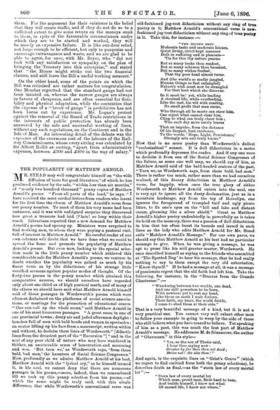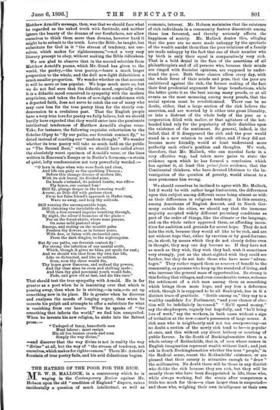THE POPULARITY OF MATTHEW ARNOLD.
AIR. STEAD may well congratulate himself on "the wide diffusion of taste for good literature," of which he has produced evidence by the sale, "within less than six months," of "nearly two hundred thousand" penny copies of Matthew Arnold's poems. " From all parte of the land," he says, " I have received the most cordial letters from readers who learnt for the first time the charm of Matthew Arnold's verse from our penny number. To most of them his very name had been unknown, and it was with unfeigned surprise they discovered how great a treasure had laid [? lain] so long within their reach. Librarians reported that a new demand for Matthew Arnold's poems had sprung up. Ministers were surprised to find working men, to whom they were paying a pastoral visit, full of interest in Matthew Arnold." No careful reader of our own columns will doubt that we have done what we could to spread the fame and promote the popularity of Matthew Arnold's poems. But even now, looking to the special selec- tion made in the little penny number which achieved this considerable sale for Matthew Arnold's poems, we venture to doubt whether the popularity was gained as much by his finest verse as by the didacticism of his strange little versified sermons against popular modes of thought. Of the forty-two poems in the penny number which attained this comparative success, we should ourselves have regarded only about one-third as of high poetical merit, and of many of the others we should have said what Matthew Arnold himself said of those passages in Wordsworth's poems which were oftenest declaimed on the platforms of social science associa- tions, or meetings for the promotion of educational crazes. " One can call up the whole scene," said Matthew Arnold in one of his most humorous passages. "A great room in one of our provincial towns ; dusty air and jaded afternoon daylight ; benches full of men with bald heads and women in spectacles ; an orator lifting up his face from a manuscript, written within and without, to declaim these lines of Wordsworth" [didactic lines from the dreariest part of the " Excursion "] "and in the soul of any poor child of nature who may have wandered in thither, an unutterable sense of lamentation and mourning and woe. 'But turn we,' as Wordsworth says, from these bold, bad men,' the haunters of Social Science Congresses." Now, profoundly as we admire Matthew Arnold at his best, Matthew Arnold with the " lyrical cry," as he himself termed it, in his soul, we cannot deny that there are numerous passages in his poems,—more, indeed, than we remembered till we took up this penny selection from his poems,—of which the same might be truly said, with this single difference, that while Wordsworth's conventional verse was old-fashioned jog-trot didacticism without any ring of true poetry in it, Matthew Arnold's conventional verse is new. fashioned jog-trot didacticism without any ring of true poetry in it. Take this, for instance
"THE SECOND BEST.
Moderate tasks and moderate leisure, Quiet living, strict-kept measure Both in suffering and in pleasure- 'Tis for this thy nature yearns.
But so many books thou !widest, But so many schemes thou breedest, But so many wishes feedest,
That thy poor head almost turns.
And (the world's so madly jangled, Human things so fast entangled) Nature's wish must now be strangled For that best which she discerns.
So it must be! yet, while leading A strained life, while overfeeding, Like the rest, his wit with reading, No small profit that man earns, Who through all he meets can steer him, Can reject what cannot clear him, Cling to what can truly cheer him ;
Who each day more surely learns That an impulse, from the distance Of his deepest, best existence, To the words, Hope, Light, Persistence,' Strongly sets and truly burns."
Now that is no more poetry than Wordsworth's dullest "ecclesiastical" sonnet. It is dull didacticism in a metre which profoundly depresses the reader. And if any one were to declaim it from one of the Social Science Congresses of the future, as some one well may, we should say of him, as Matthew Arnold said of the bald-headed orators of the past, "Turn we, as Wordsworth says, from these bold, bad men."
There is rather too much, rather more than we had ourselves realised, of this dreary didacticism in Matthew Arnold's verse, for happily, when once the true glory of either Wordsworth or Matthew Arnold enters into the soul, one is very apt to ignore all the dusty declamation, just as in a mountain landscape, say from the top of Helvellyn, one ignores the foreground of trampled turf and ugly picnic litter, to fix one's eyes on the "hill and lake and distant ocean, gleaming like a silver shield." Great as Matthew Arnold's higher poetry undoubtedly is, powerfully as it takes its hold on the memory, there was a passion of dull didacticism in him that too often burst its bounds and issued in such lines as the lady who edits Matthew Arnold for Mr. Stead calls " Matthew Arnold's Message." For our own parts, we should say that Matthew Arnold at his beet had no particular message to give. When he was giving a message, he was apt to prose like his still greater master, Wordsworth. He once described himself as saying to the friends who assembled at ' The Spotted Dog' to hear his message, that he had really nothing to say to them except the very old exhortation, " Know thyself." If he had a message at all, it was a message of passionate regret that the old faith had left him. Take the following, for instance, in the "Stanzas from the Grande Chartreuse " .-
" Wandering between two worlds, one dead,
And one still powerless to be born, With nowhere yet to rest my head, Like these on earth I wait forlorn.
Their faith, my tears, the world deride, I come to shed them at their side."
That is a very beautiful message of a kind, but it is not a very practical one. You cannot very well exhort other men to follow your example in going to weep by the side of those who still believe what you have ceased to believe. Yet speaking of him as a poet, this was much the best part of Matthew Arnold's message. He addresses M. de Senancour, the author of "Oberman," in this style- " Yes, as the son of Thetis said, I hear thee saying now : Greater by far than thou art dead ; Strive not ! die also thou!"
And again, in the exquisite lines on " Geist's Grave" (which we regret to find omitted from both the penny selections), he describes death as final,—as the "stern law of every mortal lot ":— "Stern law of every mortal lot
Which man, proud man, finds hard to bear, And builds himself, I know not what Of second life, I know not where."
Matthew Arnold's message, then, was that we should face what he regarded as the naked truth with fortitude, and neither ignore the beauty of the dreams of our forefathers, nor allow
ourselves to think them more than dreams, however hard it might be to submit to the truth. Love the Bible, he taught, but substitute for God in it "the stream of tendency, not our- selves, which makes for righteousness,"—not a very easy literary precept to obey, without making the Bible ridiculous.
We are glad to observe that in the second selection from Matthew Arnold's poems, which Mr. Stead has given to the world, the poetry,—the true poetry,—bears a much larger proportion to the whole, and the dull new-light didacticism a much smaller proportion. We wonder whether on that account it will be more or less popular. We hope much more so, but we do not feel sure that the didactic mood, especially when it is a didactic mood conceived in sympathy with the modern scepticism, and takes the form of new-light condolences with a departed faith, does not serve to catch the ear of many who may care less for the true poetry than for the stately con- descension to a. credulous past. That the English people have a very true love for poetry we fully believe, but we should hardly have expected that they would enter into the passionate intellectual tenderness of Matthew Arnold's elegiac verse- Take, for instance, the following exquisite exhortation to the Scholar-Gipsy to "fly our paths, our feverish contact fly," to dread instead of courting our " modern thought." We wonder whether its true poetry will take as much hold on the public as " The Second Best," which we should have called about the absolutely worst specimen of Arnold's verse, or the lines written in Emerson's Essays or in Butler's Sermons,—a strain of quiet, lofty condescension not very powerfully worded :—
" 0 born in days when wits were fresh and clear, And life ran gaily as the sparkling Thames ; Before this strange disease of modern life, With its sick hurry, its divided aims, Its heads o'ertaxed, its palsied hearts, was rife— Fly hence, our contact fear !
Still fly, plunge deeper in the bowering wood! Averse, as Dido did with gesture stern
From her false friend's approach in Hades turn, Wave us away, and keep thy solitude.
Still nursing the unconquerable hope, Still clutching the inviolable sh Lde,
With a free onward impulse brushing through, By night, the silver'd branches of the glade— Far on the forest-skirts, where none pursue, On some mild pastoral slope Emerge, and resting on the moonlit pales Freshen thy flowers, as in former years, With dew, or listen with enchanted ears, From the dark dingles, to the nightingales.
But fly our paths, our feverish contact fly I For strong the infection of our mental strife, Which, though it gives no bliss, yet spoils for rest;
And we should win thee from thy own fair life, Like us distracted, and like us unblest. Soon, soon thy cheer would die, Thy hopes grow timorous, and unfixed thy powers, And thy clear aims be cross and shifting made : And then thy glad perennial youth would fade, Fade, and grow old at last, and die like ours."
That should teat the true sympathy with Arnold. He is far greater as a poet when he is lamenting over that which is passing away, than when he is striving,—in vain,—to set up something new in its place. He is greater when he discerns and analyses the moods of longing regret, than when he mounts his pulpit and attempts to offer a substitute for what is vanishing from our hearts. When he speaks of "the something that infects the world," we find him unequalled. When he invents his new religion, he sinks into the flattest prose:— "Unduped of fancy, henceforth man Must labour ; must resign His all too human creeds and scan Simply the way divine," —and discover that the way divine is not in reality the way "divine" at all, but the way of "the stream of tendency, not ourselves, which makes for righteousness." There Mr. Arnold's fountain of true poetry fails, and his arid didacticism begins.







































 Previous page
Previous page